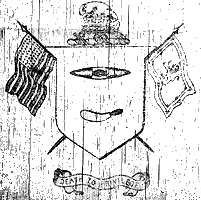

Andrew Carnegie's Coat of Arms. The Index, 29 September 1906, 11.
In addition to many other belongings, Mr. Andrew Carnegie is the possessor of a coat of arms. It was not, to be sure, granted to an ancestor for prowess on the field of battle. It has a much more interesting history. Mr. Carnegie had no coat of arms, but, like the man of enterprise and originality that he is, he went to work and devised one, and then he got an artist to paint it high up on the walls of the splendid library in his fine New York mansion.
Upon the escutcheon there is a weaver's shuttle, because his father, William Carnegie, was a weaver; there is also a shoemaker's knife, because an ancestor not very remote worked at his trade of shoemaker. They say plainly that he has no desire to ignore his humble beginning and that he wishes to honor the memory of the weaver and the shoemaker, his forebears. Mr. Carnegie has a crown, for a crest, but it is reversed and surmounted by the cap of liberty. The supporters are the American and Scotch flags, and the motto is "Death to Privilege."
Mr. Carnegie, it may be mentioned makes liberal use of mottoes. Upon the walls of his library are seen the familiar lines, "He that dare not reason is a slave; he that cannot is a fool; he that will not is a bigot." "The present moment is our ain, the next we never see," is another legend. Upon the leather lounge where he takes his afternoon siesta is painted "Rest awhile," while above, upon the wall, we see the rollicking line, "There's a good time coming, boys."
Andrew Carnegie's family came from Dunfermline, borrowing eleven shillings from a friend to aid them to emigrate in 1847. The story is told regarding this loan that recently an American firm, doing business in London, asked its patrons to suggest ideas for the distribution of Andrew Carnegie's wealth. Mr. Henry D. Lennox, of Glasgow, advised that the millionaire repay a loan of eleven shillings made by his aunt to the Carnegies when they needed help. Mr. Lennox computed that, with interest, 9 pounds was due.
It seems that Mr. Carnegie called in person on the children of the benefactor and thanked them for the generosity of their mother. From minus eleven shillings to plus $350,000,000 is a story suggestive of the Arabian Nights.
 Return to Heraldry -- A Pathfinder.
Return to Heraldry -- A Pathfinder.
 Return to Mr. Andrew Carnegie.
Return to Mr. Andrew Carnegie.